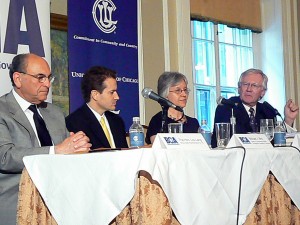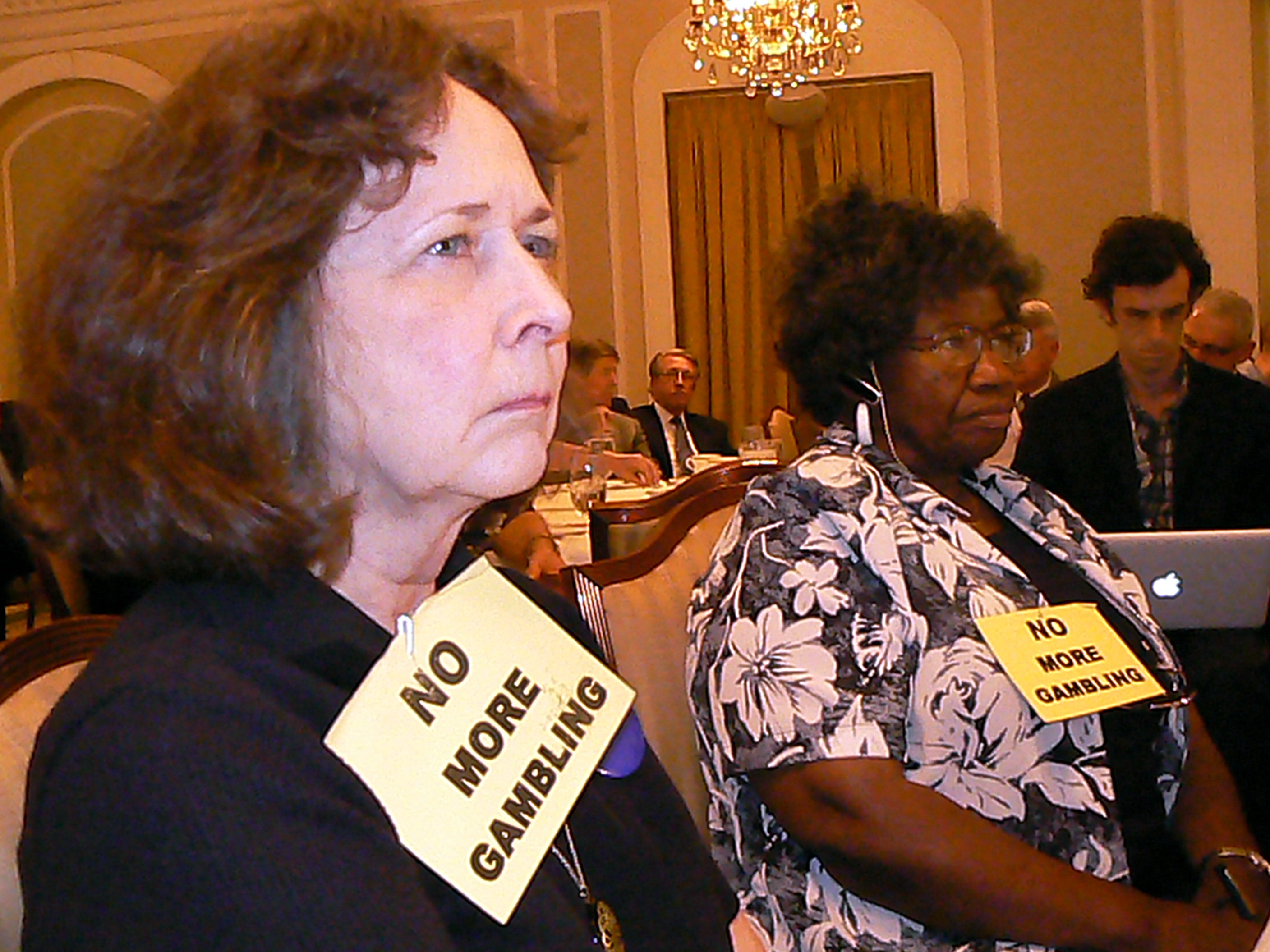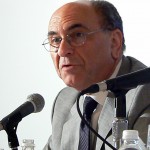By La Risa Lynch

Panelists on both sides of aisle debate the pros and cons of gambling expansion in the state during a forum sponsored by the Better Government Association.
Jerry Prosapio, check of south suburban Crestwood, did not have to listen to experts to know that expanding gambling in the state would not be a sure bet for the Chicagoland area.
Prosapio, a former compulsive gambler, knows firsthand the destructive nature gambling can do to a family. When he exhausted money from his bank account, he sought money from family and friends to feed his gambling addiction. And when that well ran dry, he took out a mafia loan. He knew he hit bottom.
“I missed a payment. They came to the house and threatened my infant son. That was my bottom,” said Prosapio whose gambling habit began playing penny poker in third grade. Gambling free for 28 years, Prosapio said: “It is a nightmare what my addiction caused.”
So when Prosapio, co-founder of Gambling Exposed, attended a Better Government Association’s forum on the pros and cons of casino expansion, his mind was already made up. He opposes gambling, especially for the south suburbs.
Southern Cook County is among five areas selected for gaming expansion under legislation authored by U.S. Rep Lou Lang (D-16). Illinois has nine casinos with a 10th set to open in Des Plaines in mid-July.
“In order for a casino to open, it has got to create new addicts,” Prosapio said, “and it isn’t going to be the people who bring $50 in there and go there once every two months.”
The BGA’s forum brought together representatives from both sides of the aisle to debate gambling expansion in the state. The four member panel was split down the middle. Proponents for the bill touted jobs job jobs while those against maligned it as bankrolling government on those who can least afford it. The June 29th forum was held at the Union League Club of Chicago, 65 W. Jackson Blvd.
Panel members included state Rep Lang, Chicagoland Chamber of Commerce (CCC) Michael J. Mini, Rev. Phillip Blackwell, senior pastor of First United Methodist Church at Chicago Temple and Anita Bedell, of Illinois Church Action on Alcohol and Addition Problems. BGA’s President and CEO Andy Shaw moderated.
Lang’s bill would expand casino operations to Chicago, Rockford, Park City, Danville and south suburban Cook County. The legislation would allow slot machines at both O’Hare and Midway airports. It would allow slots at horse racing tracks. That would also allow year-round operation of the Illinois State fairground’s horse racing track, which only operates during the state fair.
Although the bill passed both Houses, Gov. Pat Quinn has yet to receive or sign the legislation. Quinn expressed reservations about the bill’s scope. Senate President John Cullerton has put a legislative hold on the bill.
However, Lang said the bill is not about gaming, but is an economic development tool. The bill, he said, would create or save 90,000 jobs in the gaming industry as well as bring new restaurants, hotels, shopping malls and new infrastructure to the state.
He contends expanding gaming would generate $1.6 billion in fees paid over the next four years. And ongoing state revenue could generate between $400 million to $1.5 billion annually.
“People will talk about the social cost as I’m sure those to my left will, but those social costs will endure and will be here whether or not we pass this bill because the people from our city, our county, our community are going elsewhere and they’re still gambling,” Lang said to his fellow panelists.
Bedell argued that the bill does too much too fast. The state’s gaming board, she said, has 12 months to award the licenses. Bedell contends that is too fast to award five licenses considering the mayhem that followed when one casino license was awarded in 1999. It originally went to Rosemont but investigations uncovered alleged mob ties to then-Emerald Casino. That license was eventually rebid and awarded Des Plaines
“The same thing can happen with this bill,” Bedell said, also questioning Lang’s 90,000 jobs figure since casinos are losing revenues and laying off staff.
Blackwell said that corruption and Chicago are synonymous. He quipped that if the city couldn’t hire out trucks without a scandal how could Chicago operate a casino without a scandal?
Having the city own a casino is a double edge sword, Blackwell added. He explained that the city now becomes the “house” that only wins when gamblers or city residents lose their money. The city, Blackwell said, in effect “cannibalize their own people,” to make money.
“That suggests to me, that is not a good civic model,” he said.
Mini, CCC’s director of governmental relations, contends a casino anchoring an entertainment complex would be a good model to spur economic growth. The chamber has been championing a casino in the city’s downtown business hub for years.
Mini sees a downtown casino as “part of a larger economic development strategy” to “grow our convention and tourism industry.” He noted tourism routinely dries up in the winter, and the city gets passed over consistently as a convention venue. A downtown casino could remedy that, Mini said.
He estimated that a Chicago casino would generate $650 million annually in tax revenues, split between the city and state. A downtown casino would create 2,500 permanent jobs and another 1,700 new jobs from new restaurants and theaters opening up.
“This would be new revenue…,” Mini explained. “This is a direct benefit and result from the asset of a casino.”
Ken Darnell, also a co-founder of Gambling Exposed, disagreed. Darnell said most casino jobs are low-paying with high turner over or are positions shifted from one casino to another.
“It is job transfer, not job creation,” he said, adding that the social costs of gambling, such as crime, foreclosure and bankruptcy eat away at casino profits. “For every $1 the casino would contribute in terms of income to the state, it cost the state $3 [in social cost] for every $1.”
South Shore resident, Luke Townsend, supports a Chicago casino. He said it is an idea whose time has come since many Illinois residents drive to Indiana to gamble anyway.
“If we are to recoup some of those dollars and be competitive in the convention industry, we need to address it,” Townsend said. “It just makes sense.”


Be the first to comment on "Both sides weigh in on state gambling expansion"